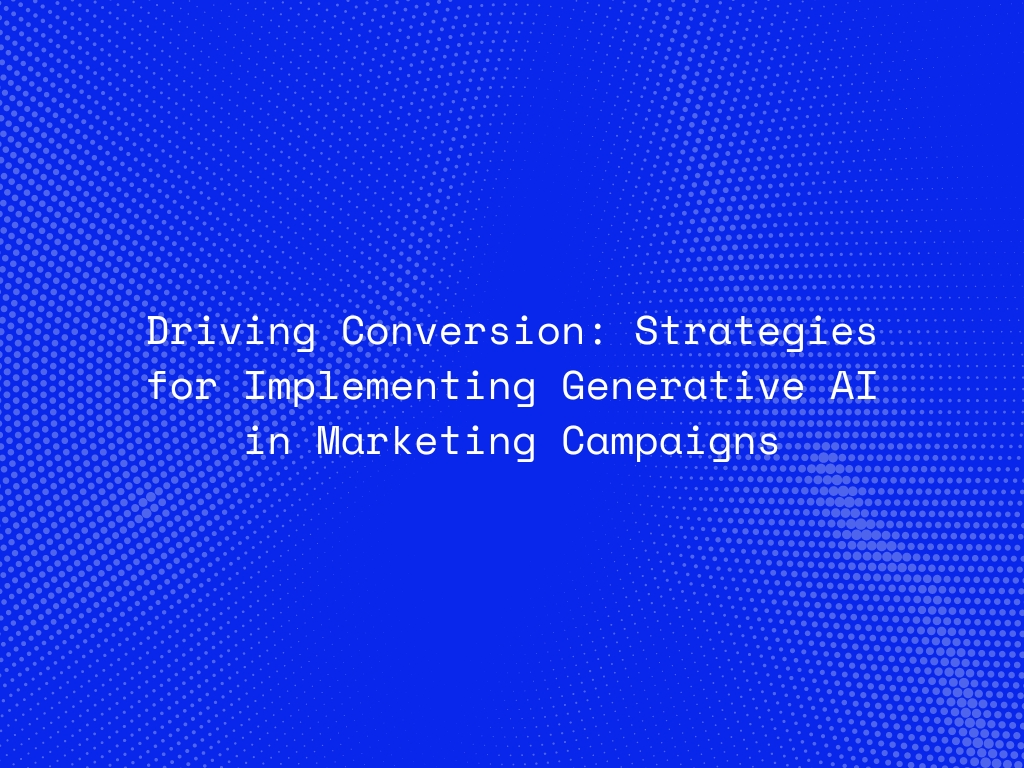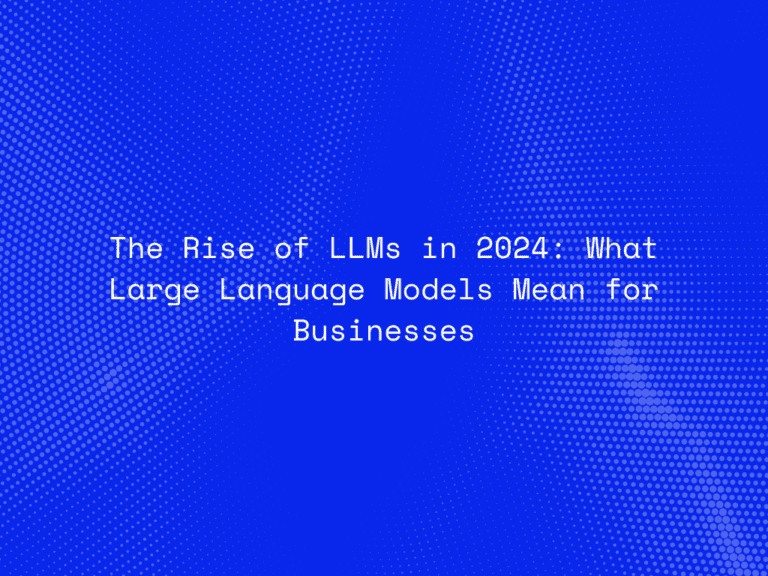In an era where personalized experiences are key to capturing consumer attention, generative AI is revolutionizing how marketers create and execute campaigns. By leveraging generative AI, businesses can generate highly targeted and personalized content, optimize ad performance, and ultimately drive higher conversion rates. This blog explores the strategies for implementing generative AI in marketing campaigns to maximize effectiveness and achieve better results.
The Role of Generative AI in Marketing
Generative AI refers to a class of AI models capable of creating new content, whether it’s text, images, audio, or video, based on learned patterns from existing data. In the context of marketing, generative AI can be used to produce personalized ads, tailor content to specific audience segments, and even generate entire marketing strategies based on data analysis. Here’s how generative AI is transforming marketing:
-
Personalized Content Creation:
- Generative AI can produce personalized marketing content at scale, creating different versions of ads, emails, or social media posts tailored to specific audiences. This ensures that each piece of content resonates with its intended audience, increasing engagement and conversion rates.
-
Dynamic Ad Creation:
- With generative AI, marketers can create dynamic ads that change based on real-time data, such as user behavior or preferences. This allows for more relevant and timely messaging, enhancing the chances of conversion.
-
Customer Journey Optimization:
- Generative AI can analyze customer data to predict the most effective touchpoints and content for each stage of the customer journey. By delivering the right message at the right time, marketers can guide prospects through the funnel more efficiently.
-
Predictive Analytics:
- Generative AI can be used to predict customer behavior and preferences, allowing marketers to anticipate needs and craft campaigns that address those needs before the customer even realizes them. This proactive approach can significantly boost conversion rates.
-
A/B Testing and Optimization:
- AI can automate the A/B testing process, generating multiple variations of ads or content and analyzing which versions perform best. This enables continuous optimization of campaigns, leading to better performance over time.
Connect With Us
Strategies for Implementing Generative AI in Marketing Campaigns
To effectively harness the power of generative AI in marketing, it’s essential to adopt a strategic approach. Here are key strategies to consider:
1. Start with Data-Driven Insights
Before implementing generative AI, it’s crucial to gather and analyze data to understand your audience’s behavior, preferences, and pain points. This data serves as the foundation for AI-driven campaigns. Key steps include:
- Audience Segmentation: Break down your audience into segments based on demographics, behaviors, and preferences. This allows for more targeted content generation.
- Behavioral Analysis: Use AI to analyze customer behavior data, such as purchase history, browsing patterns, and engagement metrics. This helps in predicting future behavior and identifying potential conversion triggers.
- Sentiment Analysis: Analyze customer feedback and social media interactions to gauge sentiment and understand how your brand is perceived. This information can guide the tone and messaging of your AI-generated content.
2. Automate Content Generation and Personalization
One of the most significant benefits of generative AI is its ability to automate content creation, making it possible to produce personalized content at scale. Implement the following practices:
- Dynamic Email Campaigns: Use generative AI to create personalized email content for different segments of your audience. AI can generate subject lines, body content, and calls to action that are tailored to each recipient’s preferences.
- Tailored Ad Creatives: Create multiple versions of ad creatives using generative AI, each customized for specific audience segments. This can include different imagery, messaging, or even product recommendations based on the user’s browsing history or interests.
- Responsive Web Design: Implement AI-driven content that adapts to the user in real-time. For instance, your website could display different headlines, images, or offers based on the visitor’s behavior or previous interactions with your brand.
Connect With Us
3. Leverage Predictive Analytics for Campaign Optimization
Generative AI can also be used to predict and optimize the outcomes of your marketing campaigns:
- Predictive Lead Scoring: Use AI to analyze historical data and predict which leads are most likely to convert. This allows you to focus your marketing efforts on high-potential prospects.
- Campaign Forecasting: Predict the performance of different marketing strategies before they’re implemented. AI can simulate the outcomes of various approaches, helping you choose the most effective strategy.
- Real-Time Adjustments: Implement AI-driven analytics tools that monitor campaign performance in real-time and suggest adjustments. This could include tweaking ad spend, changing targeting criteria, or altering content to improve results on the fly.
4. Implement AI-Driven A/B Testing
Traditional A/B testing can be time-consuming and resource-intensive. Generative AI can streamline this process by:
- Automating Variant Creation: AI can generate multiple versions of content or ads based on different parameters, such as audience demographics, location, or device type.
- Continuous Testing and Learning: Instead of running static A/B tests, use AI to continuously test different content variations and learn from the results. AI can automatically adjust the content to improve performance based on real-time data.
- Optimizing for Conversion: Focus on optimizing specific conversion metrics, such as click-through rates, engagement, or sales. AI can help identify which content variations are most likely to achieve these goals.
Connect With Us
5. Enhance Customer Engagement with AI-Powered Chatbots
AI-powered chatbots can play a significant role in driving conversions by providing personalized, real-time interactions with customers:
- Personalized Recommendations: Use chatbots to offer personalized product or service recommendations based on the user’s past behavior or stated preferences.
- Lead Nurturing: Chatbots can engage prospects with personalized messaging, guiding them through the sales funnel and addressing any questions or concerns they may have.
- 24/7 Customer Support: Provide round-the-clock support with AI chatbots that can handle a wide range of customer inquiries, improving customer satisfaction and reducing the likelihood of cart abandonment.
6. Measure and Refine Your AI Strategy
Implementing generative AI in marketing campaigns is not a one-time effort. It requires continuous measurement and refinement:
- Track Key Metrics: Monitor key performance indicators (KPIs) such as conversion rates, customer acquisition cost, and return on ad spend (ROAS) to assess the effectiveness of your AI-driven campaigns.
- Analyze AI-Generated Content: Regularly review the content generated by AI to ensure it aligns with your brand voice and resonates with your audience. Make adjustments as necessary to improve relevance and engagement.
- Iterate and Improve: Use the insights gained from your AI-driven campaigns to iterate and refine your approach. Generative AI is a powerful tool, but its effectiveness depends on continuous learning and optimization.
Connect With Us
Ethical Considerations and Challenges
While generative AI offers significant benefits, it also presents challenges that marketers need to navigate:
- Data Privacy: Ensure that your use of AI complies with data privacy regulations such as GDPR. Be transparent with customers about how their data is used and provide them with control over their information.
- Avoiding Bias: AI models can sometimes reflect biases present in the training data. It’s crucial to regularly audit your AI algorithms to identify and mitigate any potential biases.
- Maintaining Authenticity: While AI can generate content, it’s important to maintain a human touch in your marketing. Ensure that AI-generated content feels authentic and aligns with your brand values.
Conclusion
Generative AI is transforming the marketing landscape, offering new ways to create personalized, targeted campaigns that drive conversions. By strategically implementing AI-driven content generation, predictive analytics, A/B testing, and chatbots, marketers can significantly enhance their campaign effectiveness. However, success with generative AI requires a careful balance of automation and human oversight, along with a commitment to ethical practices and continuous optimization.
As businesses increasingly embrace generative AI in their marketing efforts, those that can effectively harness this technology will be well-positioned to stay ahead of the competition and deliver exceptional value to their customers.




